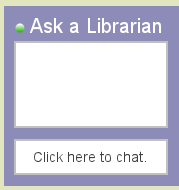Information Update - Fall 2012
Academic Integrity Tutorial Implemented for Graduate Students
- The successful implementation of an Academic Integrity Tutorial for undergraduates (See Information Update, Spring 2012) led to a request by members of the faculty for a graduate tutorial. Librarians, instructional technologists and Techcons in the Center for Teaching and Learning Excellence (CTLE) collaborated to develop an Academic Integrity Tutorial for graduate students. This tutorial was then implemented beginning in the fall of 2008.
- The graduate rendition follows a different model than the undergraduate tutorial. Rather than following the Academic Code of Honesty, it asks students to assess various examples of student papers to determine if they have been plagiarized. To underscore the value of academic integrity in their disciplines, faculty who teach in the Graduate Program wrote testimonials on academic integrity and submitted excerpts from their articles that were presented as the "original material" that the example student papers cite. Several questions about collaboration and collusion were also included. In 2011, in addition to the generic tutorial, customized tutorials for students in the Education and Health Administration and Human Resources Programs were added. These subject-specific versions use examples reflecting the language of their disciplines. Ideally, all graduate students will eventually take a unique tutorial specific to their major.
- There are no statistics for 2008, but from 2009-2011, 943 graduate students took the graduate tutorial for a 21.38% completion rate. This rate is much lower than the completion rate for undergraduates (95.7%), and it reflects the nature of adult learners. Some graduate faculty require completion of the academic integrity tutorial as a course requirement. An assessment component, an optional anonymous online survey consisting of three open-ended questions, was included at the end of the tutorial beginning in 2009, and 14.74% of the graduate students who took the tutorial also completed the survey.
- The first question in the survey was "Has your understanding of academic integrity changed after taking the tutorial?" Almost half of the graduate student (49%) replied that the tutorial made a difference. Although some students answered this question with only "yes" or "no," many included comments indicating that taking an academic integrity tutorial either reinforced what they already knew or gave them a better understanding of the issue. There were also some graduate students who said that although their understanding had not changed as a result of taking the tutorial, the tutorial provided either a "review" or a "refresher" on the subject of academic integrity, particularly since they were returning to school a number of years after receiving their bachelor's degree. Several also commented that the tutorial clarified their understanding of collusion.
- Students were also asked what they liked about the tutorial. In response to this question, several students said that what they liked about the tutorial was "the individual professor's thoughts regarding academic integrity." The final question asked if anything should be changed in the tutorial. Feedback from this question will be used to improve the tutorial.
- Graduate faculty interested in developing a customized tutorial should contact Bonnie Oldham, Information Literacy coordinator, at 941-4000 or bonnie.oldham@scranton.edu. To access the graduate Academic Integrity Tutorial in guest mode, go to https://web2.scranton.edu/cgi-bin/graduateintegrity/index.html.
—Bonnie Oldham

